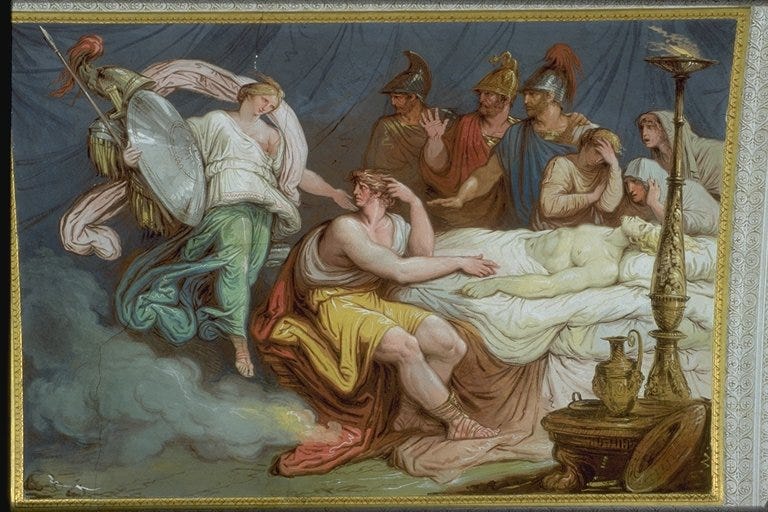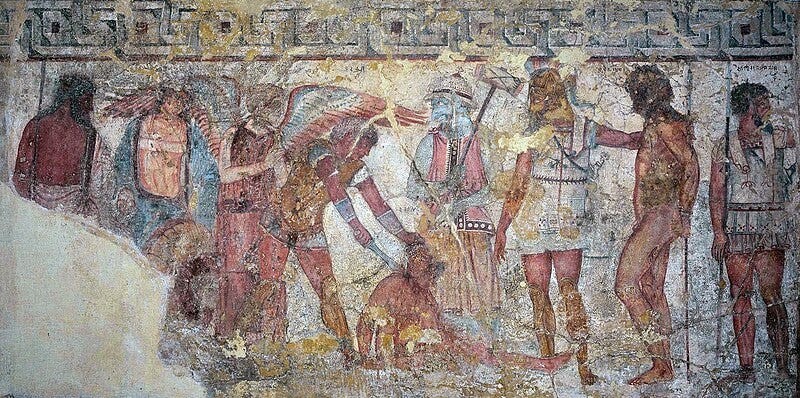This post is a continuation of my substack on the Iliad. All proceeds from the substack are donated to classics adjacent non-profits on a monthly basis. Last year this substack provided over $2k in charitable donations. Don’t forget about Storylife: On Epic, Narrative, and Living Things. Here is its amazon page. here is the link to the company doing the audiobook and here is the press page. I am happy to talk about this book in person or over zoom.
Achilles does not receive the news of Patroklos’ passing until the beginning of book 18 thanks to the prolonged struggle over the bodies in book 17. Antilokhos (Antilochus, Nestor’s son), who, according to other traditions, plays a role similar to Patroklos in the lost Aithiopis when Memnon kills him and incites Achilles’ rage anew, comes running to Achilles to tell him the “painful message”. When he finds Achilles, the scene is somewhat guided through his eyes (what narratologists might call ‘focalized’, see de Jong below), but the information is a strange variation on the kind a narrator usually provides.
Homer, Iliad 18.2-17
“Swift-footed Antilokhos came as a messenger to Achilles.
He found him in front of the straight-prowed ships,
Considering through his heart what things could have happened.
He was deeply troubled then and spoke to his own great heart:“Oh, my heart, why are the long-haired Achaeans again
Clustering around the ships, horrified from the plain?
I hope the gods haven’t brought the evil pains to bear on my heart
As my mother once warned me and told me that
The best of the Myrmidons would be torn from the light of the sun
by Trojan hands while I was still alive.
Is it really that the bold son of Menoitios has died,
The fool. I really was telling him just to push the fire
From the ships and come back, and not to battle in force with Hektor.”
While he was going over those things in his thoughts and heart,
Then the son of glorious Nestor was coming near,
Shedding warm tears when he spoke his painful message.”᾿Αντίλοχος δ’ ᾿Αχιλῆϊ πόδας ταχὺς ἄγγελος ἦλθε.
τὸν δ’ εὗρε προπάροιθε νεῶν ὀρθοκραιράων
τὰ φρονέοντ’ ἀνὰ θυμὸν ἃ δὴ τετελεσμένα ἦεν·
ὀχθήσας δ’ ἄρα εἶπε πρὸς ὃν μεγαλήτορα θυμόν·
ὤ μοι ἐγώ, τί τ’ ἄρ’ αὖτε κάρη κομόωντες ᾿Αχαιοὶ
νηυσὶν ἔπι κλονέονται ἀτυζόμενοι πεδίοιο;
μὴ δή μοι τελέσωσι θεοὶ κακὰ κήδεα θυμῷ,
ὥς ποτέ μοι μήτηρ διεπέφραδε καί μοι ἔειπε
Μυρμιδόνων τὸν ἄριστον ἔτι ζώοντος ἐμεῖο
χερσὶν ὕπο Τρώων λείψειν φάος ἠελίοιο.
ἦ μάλα δὴ τέθνηκε Μενοιτίου ἄλκιμος υἱὸς
σχέτλιος· ἦ τ’ ἐκέλευον ἀπωσάμενον δήϊον πῦρ
ἂψ ἐπὶ νῆας ἴμεν, μηδ’ ῞Εκτορι ἶφι μάχεσθαι.
Εἷος ὃ ταῦθ’ ὥρμαινε κατὰ φρένα καὶ κατὰ θυμόν,
τόφρά οἱ ἐγγύθεν ἦλθεν ἀγαυοῦ Νέστορος υἱὸς
δάκρυα θερμὰ χέων, φάτο δ’ ἀγγελίην ἀλεγεινήν·
This passage is remarkable to me for a few reasons. First, we have the application of Achilles’ epithets (“swift-footed”) to Antilochus, but in such a close proximity that any reasonable listener might feel the tension between Antilochus’ urgent message and Achilles’ lack of motion. This contrast is in part proleptic, since Achilles is about to burst back into action and become the kind of hero of force more appropriate to the conventional epithet. As Elton Barker and I have explored (Homer’s Thebes; See Roger Dunkle’s work as well and Storylife for another take) the depiction of Achilles in the Iliad plays on the tension between his traditional heroic identity, marked by swiftness, and his actions in the Iliad, where he is swift to anger but stalled in action for two-thirds of the epic. His swiftness in the Iliad is related both to the dynamic force of his anger and the swiftness (or brevity) of his life. Achilles, ironically or not, is described as swift-footed right before he permits him to lead out the Myrmidons in his stead (16.48) and he regains the epithet in his grief when he speaks to his mother soon after Antilochus arrival (18.78).
Second, there’s also an interesting angle in thinking about the Iliad and narrative time. One might imagine this scene as representing Achilles’ concern throughout Patroklos’ absence rather than just at the moment of this conflict. The join in the action is this: Hektor and Aeneas have routed the Danaans and they are fleeing across the ditch constructed to defend the ships. The book begins acknowledging, almost generically, “so they were struggling like a burning fire” and then Antilochus arrives. For me, the structure of the line recalls the beginning of the embassy in book 9 when “they find him delighting his thoughts in the clear-voiced lyre” (τὸν δ' εὗρον φρένα τερπόμενον φόρμιγγι λιγείῃ, 9.186): here, the idea is spread into two lines, first noting where he is (in front of the ships) and what he is doing (i.e., thinking about what has happened). In each case, the action ascribed in a participle (“delighting” “wondering”) to Achilles is likely the interpretation from the internal audience (the embassy, then Antilochus) framed by the narrator.
Yet, there is a potential tension between the ongoing nature of the participle (here, present and probably progressive) and the tense of the speech introduction which tends to imply a one-time action. In fact, the speech introduction and conclusion used for this speech is elsewhere used to show contemplation and deliberation over a course of action before a choice is made. As I explore elsewhere, this combination is used four times in a row in book 5 of the Odyssey with the expletive ὤ μοι ἐγώ (essentially, FML), to show Odysseus struggling with options and forced to make a choice. Indeed, throughout Homer, this speech introduction seems to mark a deliberation on options or a contemplation of the situation. With Achilles, however, there may be a pattern of reflection rather than choice. In book 20, this marks Achilles reacting to Aeneas escaping him (20.243 ff.) and in book 21, it prefaces his killing of Lykaon (cf. 21.54) but in each of those cases, the first utterance is a kind of expletive about other people’s foolishness or bad luck (ὢ πόποι) rather than his own.
In this scene, Achilles considers two options over which he has no control: whether or not Patroklos has been injured or killed is something of a coin flip, a Schrödinger’s hero kind of situation from one perspective. But the combination of Antilochus’ vision of the hero trying to figure out what happened and a speech and speech introduction sequence that usually signals choice produces what I have been thinking of as “productive dissonance” (a kind of poetic resonance built on contrast instead of echoing). A clear example of “productive dissonance” to my mind is the use of the duals in Iliad 9: a traditional form (the duals of two messengers going to an enemy or outsider) is applied to an unconventional situation (a friend/ally acting like an enemy or outsider) to emphasize its extraordinary nature.
At the beginning of book 18, we have a pattern used to mark one situation applied to something that doesn’t quite fit. What I think this means here is that the juxtaposition of a form typically used for Homeric figures deciding between two possible options (even if one is clearly not realistic) with the audience and Antilochus’ knowledge of what has occurred raises the stakes and further characterizes his denial about what he already suspects. Achilles is ruminating, he is pre-lamenting, and he is in the denial phase of grief as he calls his loved one a “fool”. In a way, this tension between his suspicion and the actual events may reflect, at times, a similar tension between audience desire for the outcomes of the action and the plot as it unfolds.

Confirming much of this is the revelation of another prophecy from Thetis that is nowhere else reported. The productive dissonance combines with the echoes of the embassy and Achilles own claim in book 9 that he has two fates (to live a long, ignoble life, or die with ternal glory, 9.410-416). No audience outside the poem believes that this is actually a choice. The dissonance produced here reflects not just the complexity of Achilles’ anticipatory grief, and the protective human response of denial, but it also may signal in part an understanding of how audiences engage with this story (and others).
The ancient scholarship on this passage speaks to some of these issues. First, one scholiast notes that it is understandable that Achilles would be in denial here.
Schol. A ad Hom. Il. 18.4
“People who are struggling for their loved ones fall into desperation among dangers. Their minds fall into misfortune in advance.”
οἱ περὶ τῶν φίλων ἀγωνιῶντες ἐν τοῖς κινδύνοις δυσέλπιδές εἰσιν. ἔστι δὲ τῶν ἐν ἀτυχίᾳ προληπτικὸς ὁ νοῦς.
There’s also some concern about what it means for Achilles to talk about the future death of the Best of the Myrmidons while Achilles is still alive. Some ancient scholars insisted that Achilles could be correct in being surprised at Patroklos’ death, since Automedon is actually the best of the Myrmidons.
Schol. A ad Hom. Il. 18.10-11a ex
“According to Rhianos [fr. 1M] the issue isn’t that there are two [who are the best of the Myrmidons] but that Patroklos is not one of the Myrmidons, since he is a Lokrian from Opos. So, Aristarchus claims that that one should know from this that he is the best of the Myrmidons after him. According to some of those who follow Homer, Aktôr the father of Menoitios allegedly took Aigina and Menoitios was born from her and lived in Opos. So, Patroklos is a Myrmidon by origin. Patroklos can be said to be a Myrmidon for other reasons as well, thanks to the fact that he leads the Myrmidons after Achilles.
But how is it, some ask, that after Achilles learned this fact from his mother he still sent Patroklos to war? One might ay that it is because she didn’t speak the name or the time clearly, that there was some forgetting of these kinds of things at the right time. But once it happened, they recall it.”
Porph. (?) χερσὶν ὕπο Τρώων <λείψειν φάος ἠελίοιο>: ἐν τῇ ῾Ριανοῦ (fr. 1 M.) οὐκ ἦσαν οἱ δύο, ἴσως ἐπεὶ οὐκ ἦν Μυρμιδὼν ὁ Πάτροκλος· Λοκρὸς γὰρ ἦν ἐξ ᾿Οποῦντος. δεῖν δέ φησιν ὁ ᾿Αρίσταρχος οὕτως αὐτὸ παραδέχεσθαι, τὸν μετ’ αὐτὸν ἄριστον τῶν Μυρμιδόνων. | καὶ κατά τινας δὲ τῶν μεθ’ ῞Ομηρον ῎Ακτωρ ὁ πατὴρ τοῦ Μενοιτίου λέγεται λαβεῖν Αἴγιναν, ἐκ ταύτης δὲ γενέσθαι Μενοίτιον καὶ οἰκῆσαι ἐν ᾿Οποῦντι. οὕτως οὖν γίνεται τὸ ἀνέκαθεν Μυρμιδὼν ὁ Πάτροκλος.
δύναται δὲ καὶ ἑτέρως Μυρμιδὼν ὁ Πάτροκλος λέγεσθαι διὰ τὸ μετὰ τὸν ᾿Αχιλλέα ἡγήσασθαι τῶν Μυρμιδόνων. | πῶς δέ, φασί, τοῦτο πεπυσμένος παρὰ τῆς μητρὸς ἔπεμπε τὸν Πάτροκλον εἰς τὸν πόλεμον; ὅτι, φαίη τις ἄν, οὔτε τοὔνομα σαφῶς εἶπεν οὔτε τὸν χρόνον, παρά τε τὸν καιρὸν λήθη γίνεται τῶν τοιούτων. ὅταν δὲ ἀποβῇ, μιμνῄσκονται.
Other posts on Iliad 18
1. Things to Do in Ilium When You’re Dead: Introducing Iliad 18: Chronology, again; Achilles’ first lament; Burden on the earth; the Kypria (Cypria)
2. The Personal Political: Hektor, Polydamas, and Trojan Politics in Iliad 18: Characterizing Hektor, again; Trojan Politics (Re)redux; Character speech
3. The Power to Control the World: Achilles' Shield and Homeric Ekphrasis: Ecphrasis; Achilles’ Shield; “Willow”; Palazzo Pubblico; Hesiodic Aspis
A short Bibliography
Barker, E.T.E. and Christensen, Joel P. 2019. Homer’s Thebes. Hellenic Studies 84. Washington, DC.
Christensen, Joel P. The many-minded man: the « Odyssey », psychology, and the therapy of epic. Myth and Poetics; 2. Ithaca (N. Y.): Cornell University Pr., 2020.
Davies, Malcolm. 2016. The Aithiopis: Neo-Analysis Reanalyzed. Hellenic Studies 71. Washington, DC.
de Jong, I. J. F. 2001. A Narratological Commentary on the Odyssey. Cambridge.
Dunkle, R. 1997. “Swift-Footed Achilles.” The Classical World 90: 227–234.


